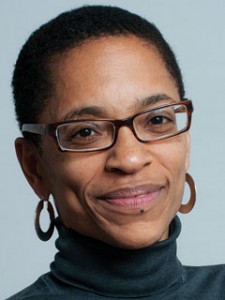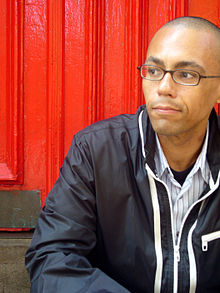Framing Black Fiction
Professor Eve Dunbar’s commitment to exploring the spectrum of Black literary production, and more broadly black art production, lead to this particular Ford Scholars project in which Laci Dent and I assisted Professor Dunbar in the exploration of the relationships between the visual arts and Black literary fiction. We began the project constructing portfolios on a host of Black literary fiction authors and an editor of many Black Authored titles, to provide Professor Dunbar with detailed contextualized views of the subjects we would interview. In our research of archives, literary fiction, academic writings and interviews, we focused on the links between the visual arts and the authors work and processes. We focused on why it might be beneficial to understanding mass culture through exploring these links between visual arts and black authorship.
Author Martha Southgate left, Author Victor Lavalle right
The intensive research periods culminated in a series of interviews with authors, Tayari Jones, Kiese Laymon, Victor Lavalle, Martha Southgate, and editor at Random House, Chris Jackson, all of whom displayed a diverse set of relationships with visuality in their art production. Yet all of the interviews touched upon interesting narratives of progress, liberation, and black artist tradition. In the interview with Chris Jackson he highlighted disjunctures in the work of contemporary black authorship, Martha Southgate yearned to see greater interest in the diverse production of work on the lives of Black people today, and Kiese Laymon lamented the potential for love and honesty that is threatened when Black youth, in particular, don’t have access to diverse representations of themselves across media forms. These topics of nurturing, building, setting the tools for empowerment, and love for Black art production sprung from the theorization upon visuality in authorship, all of which has inspired my own personal work to look towards fiction as a space of radical imagination and theorization upon social ills, specifically pertaining to racist, patriarchal, and capitalist exploitation and marginalization. The research and interviews conducted lead everyone involved in the project with a plethora of deductive studies to explore.
Laci Dent explains how the Ford Scholarship continues to influence her work and thought production, “I was interested in the idea of black identity being tied to iconicity in the visual realm (film, television, and etc). I’m interested in depicting black subjects in the visual realm as in ‘process’, as ‘thinking’ beings who are subjective and hold claim to some form of consciousness. Later in the summer, I’m shooting a short film in New Orleans called “Shared Wounds” that challenges the troubling nature of blackness in visuality.”


